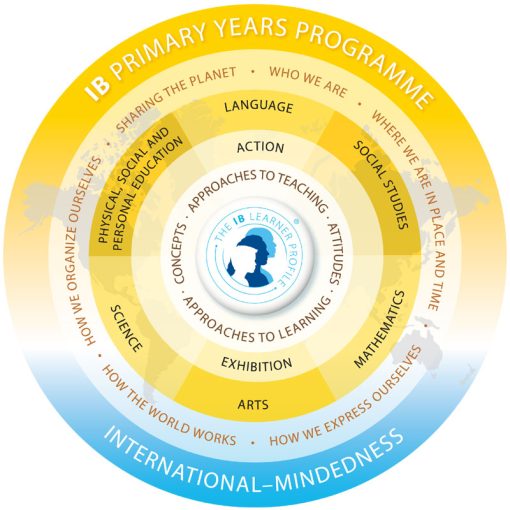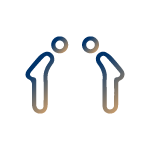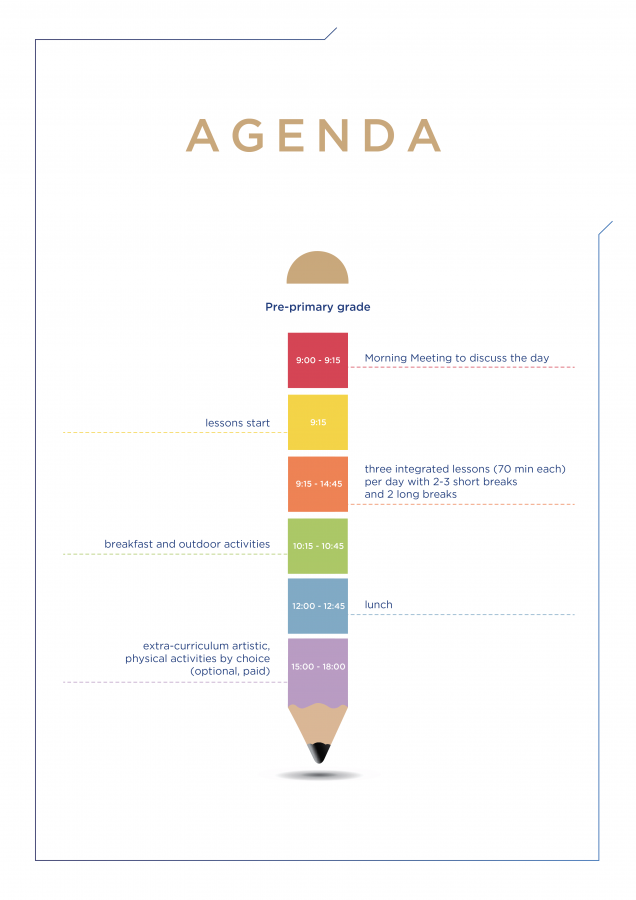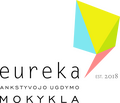International Baccalaureate Program for Grades 0–4 (IB PYP) at Erudito Licėjus
Erudito Licėjus is a candidate school for the IB PYP program, The International Baccalaureate Primary Years Program. Since 2020, Erudito Licėjus has been implementing the IBDP program for students in grades 11–12, so the introduction of IB PYP in pre-primary and primary school is a step towards a broader program that reflects our educational philosophy. At the heart of our commitment to education lies the International Baccalaureate (IB) Primary Years Program (PYP), a framework that emphasizes holistic development and the nurturing of internationally minded young learners. We maintain the existing curriculum and integrate it with the principles and methods of the IB PYP education program.
IB PYP offers a research-based, interdisciplinary learning program that enhances understanding of connections between various subjects. The program focuses on contextual and experiential learning, as well as project activities.
IB PYP academic years are divided into six inquiry units, each lasting 6-8 weeks, linking the school’s educational goals to six IB PYP transdisciplinary themes:
- Who we are;
- Where we are in place and time;
- How we express ourselves;
- How the world works;
- How we develop ourselves;
- How we share the planet.
These themes are selected based on their relevance to the real world and are explored in all subject groups for 6 weeks each. This helps students take responsibility for their learning process, understand its meaning, and connect the content to the real world. Learning is based on the inquiry method, with students actively participating in the learning process.
Our assessment at Erudito Licėjus policy is intricately woven into the fabric of the IB PYP, reflecting our dedication to fostering inquiry-based learning, critical thinking, and the development of well-rounded individuals. Our assessment approach is a tool to observe, accumulate, and utilize information about students’ learning experiences. The assessment approach in the Primary Years Program (PYP) is ideographic, focusing on describing students’ achievements and progress through text rather than assigning grades. This policy outlines the principles and practices guiding assessment in the Primary Years Program (PYP) at our school. We also follow The Ministerial order by the Ministry of Education of Lithuania, February 25th, 2004, ISAK-256, ‘due to the concept of assessment of the progress and achievements by students’.
Within the framework of the PYP, we understand that fostering a commitment to collaboration, friendliness, respect, and ethical cooperation is essential for cultivating future leaders who will contribute positively to an ever-changing global society. The assessment policy, therefore, extends beyond academic measurements to include the evaluation and encouragement of essential interpersonal skills, ethical considerations, a sense of social responsibility, and general competences. The main purpose of assessment at Erudito Licėjus is to teach students to learn.
IB PYP places a strong emphasis on developing the following student skills:
- Thinking
- Communication (collaboration)
- Inquiry
- Self-management
- Social (community)
These skills are essential goals of the IB PYP program, also known as ATL (Approaches to Learning) – the skills of learners’ profiles and learning methods that we begin to develop from preschool and primary classes.
International Baccalaureate (IB) Learner Profile:
- Caring
- Open-minded
- Reflective
- Inquirers
- Thinkers
- Communicators
- Balanced
- Courageous
- Knowledgeable
- Principled
For more information about IB and its programs, visit www.ibo.org.
The International Baccalaureate Primary Years Program (IB PYP) in Erudito Licėjus
IB PYP Coordinators in Vilnius: Head of Primary Programs, National Primary School Teacher Dalia Valaikienė, International Primary School Teacher Katarzyna Christop; in Kaunas: Primary School Teacher Methodologist Rūta Gudynienė, Head of Primary Programs Daiva Jankauskienė.
How do we build relationships in Erudito Licėjus community?
We believe that the intellectual growth of each child begins with the ability to independently seek solutions, to have a responsible opinion, to be able to hear other opinions and seek consensus.
Our future begins now. By educating future leaders, we need to formulate the right approach that a long-term sustained effort and dedication are necessary to achieve the best results.
Students need to understand and feel that they will always achieve more in life by working together with each other, also that each contribution will be strengthened if friendly, respectful and ethical cooperation-based relations are developed.
Engagement and care for others is the key to success. If children learn to treat others as they would like to be treated themselves, a responsible attitude towards the consequences of their actions – the basis of citizenship – will be shaped.
Basic principles of education
Integrated Approach
1. An exceptional feature of our education is integrity.
That is comprehensiveness, meaningfulness and coherence. We organize education as a unified system, not splitting into separate, unrelated teaching subjects, but by joining themes, projects and interdisciplinary initiatives.
Students are in the centre of educational process. We look at every problem, fact, and phenomenon from the students’ position and experience. The perception and thinking of primary school students are inseparable. Therefore, the content of the curriculum must be integral and consistent with the characteristics of certain age groups.
Each child has important links to real life, different contexts. Learning what is important, significant to the learner is meaningful. The aim of every topic is to make it relevant and meaningful to the students.
We believe in interdisciplinary integration – looking at any topic or problem, we strive to develop a variety of skills. Integration enables teachers to develop the student’s thinking powers, their linguistic, visual, expressive, artistic, healthy lifestyle skills, and physical culture.
Integrated learning is based on team projects and gaming techniques, involving collaboration, creativity and intellectual curiosity.
2. How do we learn integrated topics?
| Topics throughout the year: | Monthly topics: | Months: |
|---|---|---|
| PERSONALITY | 1. Persisting | September |
| 2. Managing Impulsivity | ||
| 3. Honest and Empathetic Listening | October | |
| EXPERIENCES | 4. Thinking Flexibility | |
| 5. Thinking about Thinking | November | |
| 6. Striving for Accuracy and Precision | ||
| RELATIONSHIP | 7. Questioning and Posing Problems | December |
| 8. Applying Past Knowledge to New Situations | ||
| 9. Thinking and Communicating with Clarity and Precision | January | |
| SOCIETY | 10. Gathering Data through All Senses | |
| 11. Creating, Imagining and Innovating | February | |
| 12. Responding with Wonderment and Awe | ||
| LIABILITY | 13. Taking Responsible Risk | March |
| 14. Finding Humour | ||
| WORLD | 15. Thinking Interdependently | April |
| 16. Remaining Open to Continuous Learning |
Experience-Based Learning
We believe that one of the three essential resources for a child’s learning is experience.
Students are active and gain skills and experience at school. Everything what is learned in the classroom has correspondences with real life. Experiential project works are integrated into the learning process. For example, senior students analyse the financial and social activities of real businesses and organizations. By analysing companies, students find and identify problems and find solutions by turning them into value-creating things. Experiential projects are special, as students learn to work in groups, to listen to other opinions, to reflect critically and to analyse, and to gain common insights from the common solutions they find, which they use in their perceptions and behaviour.
Kids start asking about the world very early, at the age of three or four, and questioning everything around, they need reasonable answers to emerging questions, they need to understand why something is going on and how it can be defined. By strengthening the ability to question, we educate a person who does not limit oneself trying to find the correct answer but apply critical thinking skills and finds new ways for solving problem.
Kids want to be surrounded by other children, but excessive emphasis on personal achievements and competition has undermined the capacity for cooperation. It is important for us that children learn how to act in a team, knowing that everyone in the team is important, and that each person can demonstrate leadership which is needed in different situations in order to help the team.
The world becomes very small, we can reach any place all around the world, communicate with very different people, to know very different cultures. The realization that we are becoming citizens of the world, working and traveling everywhere requires the ability to adapt in all environments and intercultural teams.
We increasingly emphasize the importance of ideas, but it is even more important to develop the ability to demonstrate initiatives, take responsibility for the result. An active initiative and the ability to properly organize activities are the abilities necessary for achieving high results.
Nowadays, there is a lot of written information, where the focus of the main ideas and knowledge becomes more and more complex. Therefore, it is necessary to develop the ability to communicate clearly, briefly and fluently sharing the most important information, both written and oral, also develop public speaking skills.
The rapid technological improvement not only extends information access, but also raises challenges: how to effectively select the most important information, how to ensure the best use of it for solutions? It is therefore necessary to learn how to use technology to make better decisions and gain higher achievements.
These are the most basic and difficult competences to develop, as high demands and high levels of workload dampen curiosity and zeal. Therefore, a high pedagogical professionalism is required, with the ability to constantly find new ways and experiment. There is a need for a wide range of active learning and creative approaches in order to develop the desire for continuous learning, research and development.
Erudito Licėjus is a School of Thinking
“Learning without thinking is meaningless. Thinking without learning is harmful.” Confucius
At Erudito Licėjus, attention is paid to developing thinking skills. Each member shares general commitments and constantly thinks about what is going on in the educational process.
The entire community is involved in learning to think effectively, critically and creatively, and adapt these abilities and techniques to the joint design of an effective teaching program and activities.
English professor Guy Claxton compares the thinking habits with skills and describes a difference. According to him, abilities are what a person can do but does not necessarily do, and thinking habits are what a person chooses to do. Thus, the habit of thinking means the tendency of a person to behave in a certain way.
Thinking habits are not yet another “discipline” added to teaching curriculum. Thinking habits are “embedded” into school life and curriculum.
Habits of Mind
 PERSISTING
PERSISTING
Sticking to task at hand; Follow through to completion; Can and do remain focused.
 MANAGING IMPULSIVITY
MANAGING IMPULSIVITY
Take time to consider options; Think before speaking or acting; Remain
 THINKING ABOUT THINKING (Metacognition)
THINKING ABOUT THINKING (Metacognition)
Being aware of own thoughts, feelings, intentions and actions; Knowing what I do and say affects others; Willing to consider the impact of choices on myself and others.
 STRIVING FOR ACCURACY
STRIVING FOR ACCURACY
Check for errors; Measure at least twice; Nurture a desire for exactness, fidelity & craftsmanship.
 LISTENING WITH UNDERSTANDING AND EMPATHY
LISTENING WITH UNDERSTANDING AND EMPATHY
Pay attention to and do not dismiss another person’s thoughts, feeling and ideas; Seek to put myself in the other person’s shoes; Tell others when I can relate to what they are expressing; Hold thoughts at a distance in order to respect another person’s point of view and feelings.
 THINKING FLEXIBILITY
THINKING FLEXIBILITY
Able to change perspective; Consider the input of others; Generate alternatives; Weigh options.
 QUESTIONING AND POSING PROBLEMS
QUESTIONING AND POSING PROBLEMS
Ask myself, “How do I know?”; develop a questioning attitude; Consider what information is needed, choose strategies to get that information; Consider the obstacles needed to resolve.
 APPLYING PAST KNOWLEDGE TO NEW SITUATIONS
APPLYING PAST KNOWLEDGE TO NEW SITUATIONS
Use what is learned; Consider prior knowledge and experience; Apply knowledge beyond the situation in which it was learned.
 THINKING AND COMMUNICATING WITH CLARITY AND PRECISION
THINKING AND COMMUNICATING WITH CLARITY AND PRECISION
Strive to be clear when speaking and writing; Strive be accurate to when speaking and writing; Avoid generalizations, distortions, minimizations and deletions when speaking, and writing.
 GATHERING DATA THROUGH ALL SENSES
GATHERING DATA THROUGH ALL SENSES
Stop to observe what I see; Listen to what I hear; Take note of what I smell; Taste what I am eating; Feel what I am touching.
 TAKING RESPONSIBLE RISKS
TAKING RESPONSIBLE RISKS
Willing to try something new and different; Consider doing things that are safe and sane even though new to me; Face fear of making mistakes or of coming up short and don’t let this stop me.
 FINDING HUMOUR
FINDING HUMOUR
Willing to laugh appropriately; Look for the whimsical, absurd, ironic and unexpected in life; Laugh at myself when I can.
 CREATING, IMAGINING, INNOVATING
CREATING, IMAGINING, INNOVATING
Think about how something might be done differently fromthe “norm”; Propose new ideas; Strive for originality; Consider novel suggestions others might make.
 RESPONDING WITH WONDERMENT AND AWE
RESPONDING WITH WONDERMENT AND AWE
Intrigued by the world’s beauty, nature’s power andvastness for the universe; Have regard for what is awe-inspiring and can touch my heart; Open to the little and big surprises in life I see others and myself.
 THINKING INTERDEPENDENTLY
THINKING INTERDEPENDENTLY
Willing to work with others and welcome their input and perspective; Abide by decisions the work group makes even if I disagree somewhat; Willing to learn from others in reciprocal situations.
 REMAINING OPEN TO CONTINUOUS LEARNING
REMAINING OPEN TO CONTINUOUS LEARNING
Open to new experiences to learn from; Proud and humble enough to admit when don’t know; Welcome new information on all subjects.
What do pre-primer do?
Preschool education at “Erudito” licėjus allows us to develop what we believe from an early age – each of our children is a person who desires to know, is able to create, stands out with achievements. In preschool education, we focus on the child, so the process is active, attractive and joyful.
Children are admitted to preschool classes from the age of 5, class consists of 20 children with a preschool education teacher. Preschool education activities consists of thematic weeks, which are examined in all aspects. Preschool learning 3 integrated content lessons with shorter and longer breaks during which children study intensively at school and do not receive any homework. At home, students receive creative assignments that they complete during the week.
What kind of assessment is applied?
At “Erudito” licėjus, we focus on high standards of ethics and learning in pursuit of high achievements, so we value not only students’ knowledge, but also the general and special competencies they have acquired. Pre primary education students are assessed by a descriptive (ideographic) method of individual progress. At the beginning of the school year, individual educational goals are discussed with parents, twice a year, and at the end of each semester assessment profiles are developed. They are discussed during a meeting with the parents. A continuous formal assessment of pupils’ progress is recorded in an e-diary.





 PERSISTING
PERSISTING MANAGING IMPULSIVITY
MANAGING IMPULSIVITY THINKING ABOUT THINKING (Metacognition)
THINKING ABOUT THINKING (Metacognition) STRIVING FOR ACCURACY
STRIVING FOR ACCURACY LISTENING WITH UNDERSTANDING AND EMPATHY
LISTENING WITH UNDERSTANDING AND EMPATHY THINKING FLEXIBILITY
THINKING FLEXIBILITY QUESTIONING AND POSING PROBLEMS
QUESTIONING AND POSING PROBLEMS APPLYING PAST KNOWLEDGE TO NEW SITUATIONS
APPLYING PAST KNOWLEDGE TO NEW SITUATIONS THINKING AND COMMUNICATING WITH CLARITY AND PRECISION
THINKING AND COMMUNICATING WITH CLARITY AND PRECISION GATHERING DATA THROUGH ALL SENSES
GATHERING DATA THROUGH ALL SENSES TAKING RESPONSIBLE RISKS
TAKING RESPONSIBLE RISKS FINDING HUMOUR
FINDING HUMOUR CREATING, IMAGINING, INNOVATING
CREATING, IMAGINING, INNOVATING RESPONDING WITH WONDERMENT AND AWE
RESPONDING WITH WONDERMENT AND AWE THINKING INTERDEPENDENTLY
THINKING INTERDEPENDENTLY REMAINING OPEN TO CONTINUOUS LEARNING
REMAINING OPEN TO CONTINUOUS LEARNING
